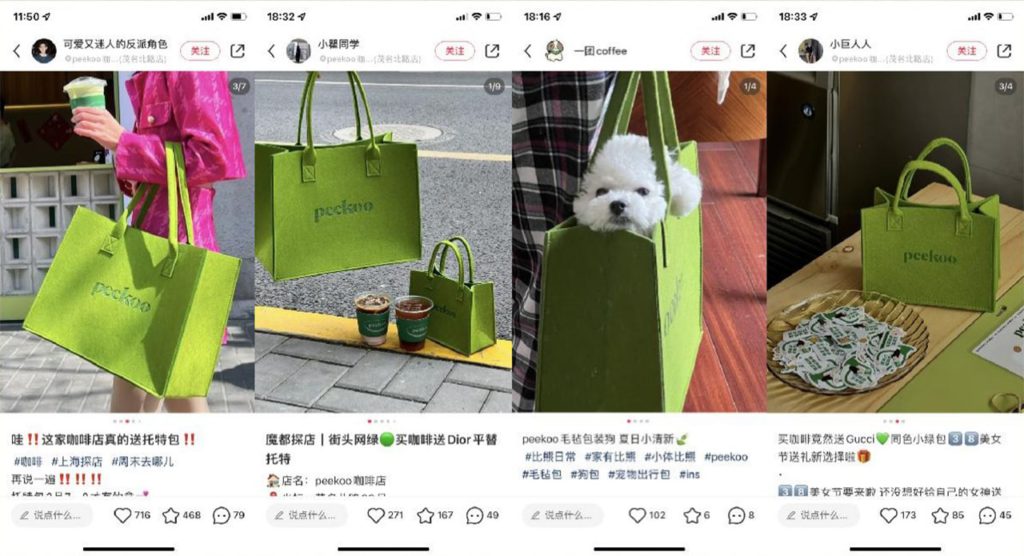The coffee industry in 2023 has witnessed significant changes, marked by fierce competition, including a price war at RMB 9.9 (USD 1.4), product homogenization, and an influx of franchise stores in lower-tier Chinese markets.
According to Canyan Data, as of September 2023, only 42,450 out of the 77,083 coffee shops established this year are still operating, indicating the closure of around 35,000 establishments.
However, amidst this challenging landscape, some companies are still expanding. Major players like Starbucks are opening a new store approximately every nine hours, Luckin Coffee has surpassed 10,000 stores, Cotti Coffee has established 6,000 stores in less than a year, and even Manner, once focused on boutique coffee in Shanghai, has recently opened its 1,000th store.
Another noteworthy player that has experienced substantial growth in the past two years is Peekoo Coffee. Founded in Shanghai in 2021, Peekoo gained attention in March 2022 with a promotion offering a free green felt bag with every coffee purchase, which became widely popular on Douyin (the Chinese equivalent of TikTok) and Xiaohongshu (also known as Red internationally). Peekoo has since expanded beyond Shanghai, operating nearly 100 stores nationwide and distributing over a million felt bags.

The founding and growth of Peekoo can be attributed to two main factors. First, its timeliness: Peekoo was established during a dynamic period when there were plenty of opportunities in China’s coffee industry. Second, its origin in Shanghai, a city with a robust coffee culture. According to Li Yufeng, Peekoo’s founder, the intention is to leverage Shanghai’s reputation as a first-tier, coffee-drinking city when building the brand.
According to various reports, a 12-square meter Peekoo store along Shanghai’s North Maoming Road generated over RMB 30,000 (USD 4,220) in daily sales when first opened. Noting this success, Peekoo quickly expanded, operating three stores by March 2022, with monthly sales ranging from RMB 240,000–300,000 (USD 33,700–42,200).
Peekoo’s rapid growth can be attributed to its differentiated approach to building brand awareness. According to Li, two types of businesses exist: brand-oriented businesses, and channel-oriented businesses. The former involves creating “exquisite waste” products, which may be unprofitable but appeal to consumers, fostering brand loyalty. Peekoo’s green felt bag promotion exemplifies this concept, creating virality and raising brand awareness.
When the pandemic abruptly arrived several years ago, it posed challenges for offline businesses but also provided an opportunity for companies to reassess their models and mitigate risks. In the latter half of 2022, Peekoo responded by adjusting its expansion strategy to open stores beyond Shanghai, testing the prevailing belief that regional brands faced challenges in achieving widespread success.
In July 2022, Peekoo opened a store in Beijing SKP, officially expanding beyond Shanghai. In March 2023, it initiated a new partnership model to collaboratively open Peekoo stores. As of November this year, Peekoo operates over 20 direct-operated stores and more than 70 jointly operated stores, aiming to reach 300 stores next year.
Shanghai and Beijing serve as Peekoo’s two bases, with 11 stores in the former and 10 in the latter. The company has established teams and supply chains in both cities, expanding outward from these bases.
Peekoo operates three store types—in office buildings, shopping malls, or along streets—with the majority in office buildings and shopping malls. To reduce operating costs, Peekoo prioritizes digitalization, omitting cashier counters, using cameras for security, and pre-programming menus and SOPs in its coffee machine system. Barista training, which typically took 10–15 days, is claimed to require only four hours. A Peekoo store that is 20 square meters or less in size also requires only three employees on average.
In the near future, Peekoo Coffee plans to continue improving operational efficiency, reducing supply chain costs, enhancing its brand, and launching new products. In August this year, Peekoo raised strategic funding from Tiantu Capital and NX Fund, primarily intended for brand and supply chain development.
KrASIA Connection features translated and adapted content that was originally published by 36Kr. This article was written by Yang Dian for 36Kr.
